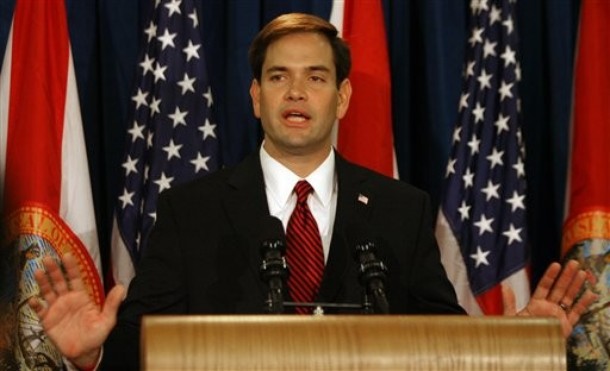Marco Rubio's American Exceptionalism.

Andrew Ferguson argues that Republicans should cloth themselves - ala Marco Rubio - in the language of American exceptionalism. Daniel Larison isn't so sure:
If all that Americanists meant by American exceptionalism was that our political values and constitution are distinctively ours, I wouldnâ??t object. The trouble is that this is not all that they mean by it. They clearly mean to say that America is not simply unique and has distinctive political values, but that America is markedly superior to and significantly different from all other nations in terms of economic dynamism and political freedom. That is partly what Marco Rubio means by it, and from the praise he heaps on Rubio I assume this is what Ferguson thinks American exceptionalism means.There was a time when this was true, or at least partly true, but over the last half century America and â??the rest of the worldâ? have changed enough that we cannot claim to be the most free or most economically dynamic country in the world. If all that Rubio wanted to say was that the U.S. ought to be the most free and most economically dynamic country, and that he believes that current policies are preventing that from happening, he could say that. Instead, he subscribes to the claim that America is the â??greatest nation in all of human history.â? Unless this is being measured in the crudest terms of global power, Iâ??m not sure how one would substantiate such a claim, and even then Iâ??m not sure that the claim would hold up.
We track a lot of global rankings and lists around here and itâ??s hard to identify many that place the U.S. at the top. Itâ??s not the best place to start a business, not the most entrepreneurial, doesnâ??t have the best health outcomes, isnâ??t the least corrupt, isnâ??t the most prosperous, and on and on.
That's not to say America is unexceptional - it has the world's largest economy and the world's most potent military. It has helped create and lead a number of global institutions that have shaped the world's economic and security policy. It has played an undeniably unique role in world affairs since 1945. And, as Larison notes, it has a distinct and estimable constitution and set of political values.
But this is really kind of besides the point, I think. The purpose of the exceptionalist rhetoric is to serve as campaign agitprop. Indeed, Ferguson notes at the end of his piece, it "sounds like a campaign theme." The unstated but clearly intentional purpose of which is to cast opposing policies into the realm of the un-American, or even anti-American. The other purpose - one advanced more by intellectuals than politicians - is to safeguard the idea that because America is uniquely superior to the rest of mankind, its global role as guardian and protector of the world must be safe-guarded.
This view may actually collide with the politicians intent on restoring America's economic health by paring back some American military commitments and spending. But for now, the two seem to be co-existing just fine.
(AP Photo)



